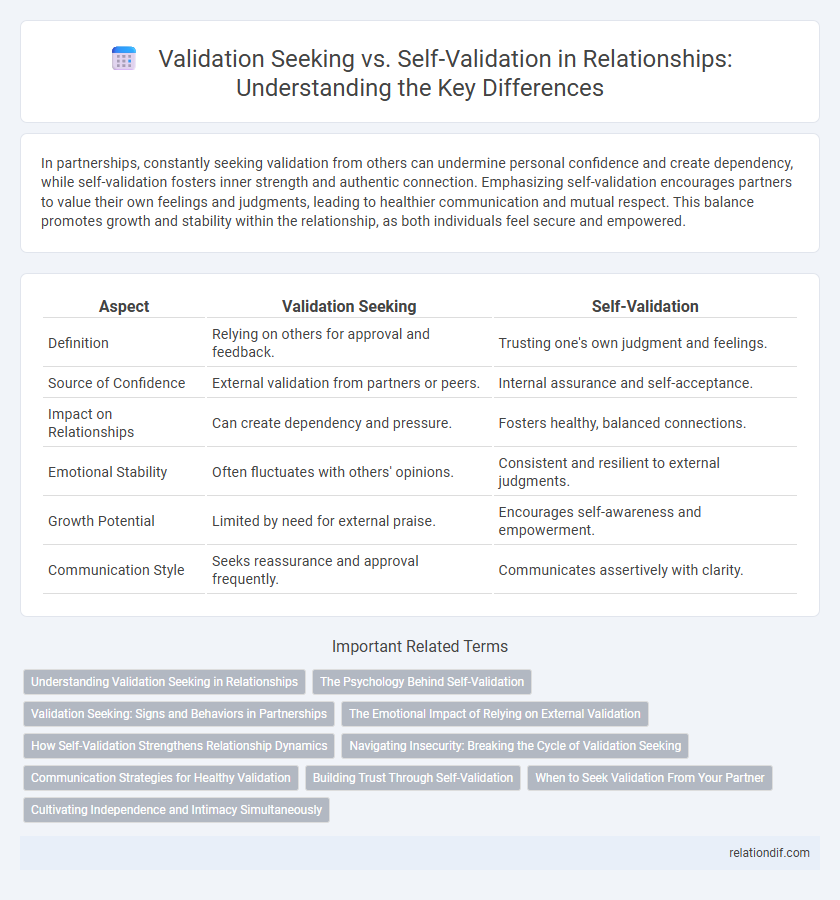In partnerships, constantly seeking validation from others can undermine personal confidence and create dependency, while self-validation fosters inner strength and authentic connection. Emphasizing self-validation encourages partners to value their own feelings and judgments, leading to healthier communication and mutual respect. This balance promotes growth and stability within the relationship, as both individuals feel secure and empowered.
Table of Comparison
| Aspect | Validation Seeking | Self-Validation |
|---|---|---|
| Definition | Relying on others for approval and feedback. | Trusting one's own judgment and feelings. |
| Source of Confidence | External validation from partners or peers. | Internal assurance and self-acceptance. |
| Impact on Relationships | Can create dependency and pressure. | Fosters healthy, balanced connections. |
| Emotional Stability | Often fluctuates with others' opinions. | Consistent and resilient to external judgments. |
| Growth Potential | Limited by need for external praise. | Encourages self-awareness and empowerment. |
| Communication Style | Seeks reassurance and approval frequently. | Communicates assertively with clarity. |
Understanding Validation Seeking in Relationships
Seeking validation in relationships often stems from a desire for external approval, which can create dependence on a partner's feedback for self-worth. Self-validation, however, involves recognizing and affirming one's own feelings and experiences without needing constant reassurance from others. Healthy partnerships balance mutual support with individual self-validation, fostering emotional resilience and authentic connection.
The Psychology Behind Self-Validation
Self-validation is a psychological process where individuals acknowledge and accept their own emotions, thoughts, and experiences as legitimate, reducing reliance on external approval in partnerships. This internal confirmation fosters emotional resilience, promoting healthier communication and mutual respect between partners. Understanding the psychology behind self-validation helps individuals develop autonomy and maintain a balanced, supportive relationship dynamic.
Validation Seeking: Signs and Behaviors in Partnerships
Validation seeking in partnerships often manifests through constant reassurance requests, excessive need for approval, and difficulty making decisions without partner input. Individuals exhibiting these behaviors may display heightened sensitivity to criticism and frequently prioritize their partner's opinions over their own self-worth. Recognizing these signs is crucial for fostering healthier communication and mutual respect within relationships.
The Emotional Impact of Relying on External Validation
Seeking validation from a partner often leads to emotional instability, as self-worth becomes dependent on external approval rather than intrinsic confidence. This reliance can cause anxiety, decreased self-esteem, and feelings of inadequacy when validation is not received. Developing self-validation fosters emotional resilience, creating a healthier, more balanced partnership dynamic.
How Self-Validation Strengthens Relationship Dynamics
Self-validation within partnerships fosters emotional resilience by encouraging individuals to acknowledge and trust their own feelings, reducing dependency on external approval. This internal confidence enhances communication, allowing partners to express needs authentically and respond empathetically. Strengthened self-validation leads to healthier relationship dynamics by promoting mutual respect and balanced emotional support.
Navigating Insecurity: Breaking the Cycle of Validation Seeking
Navigating insecurity in partnerships requires a conscious shift from validation seeking to self-validation, fostering emotional resilience and authentic connection. Emphasizing self-awareness and inner confidence reduces dependence on external approval, breaking the repetitive cycle of insecurity-driven behavior. Cultivating self-validation strengthens trust and communication, essential for a balanced and fulfilling relationship dynamic.
Communication Strategies for Healthy Validation
Effective communication strategies for healthy validation in partnerships prioritize active listening and empathetic responses, ensuring each partner feels genuinely heard and understood. Using "I" statements instead of accusatory language reduces defensiveness and fosters open dialogue focused on personal feelings and experiences. Consistent acknowledgment of each other's emotions creates a foundation of trust, reinforcing self-validation while balancing external validation needs.
Building Trust Through Self-Validation
Building trust in partnerships requires a foundation of self-validation, where individuals acknowledge their own worth and experiences without relying solely on external approval. This internal affirmation enhances emotional resilience and fosters open communication, enabling partners to engage authentically. Prioritizing self-validation reduces dependency on validation-seeking behaviors, which can otherwise create insecurity and hinder mutual trust development.
When to Seek Validation From Your Partner
Seeking validation from your partner is essential during moments of uncertainty, significant life decisions, or emotional distress, as it strengthens trust and emotional connection. Self-validation empowers personal growth and confidence, but turning to your partner for honest feedback can prevent misunderstandings and deepen intimacy. Balance between self-validation and seeking external support fosters a healthy partnership rooted in mutual respect and understanding.
Cultivating Independence and Intimacy Simultaneously
Balancing validation seeking and self-validation is crucial in partnerships to foster both independence and intimacy. Encouraging open communication supports individual growth while reinforcing emotional connection, creating a healthy dynamic where both partners feel valued and understood. This approach cultivates mutual respect, reducing dependency on external approval and enhancing relationship resilience.
validation seeking vs self-validation Infographic

 relationdif.com
relationdif.com